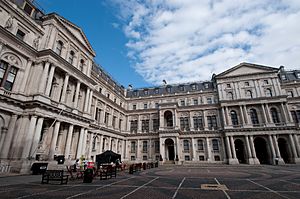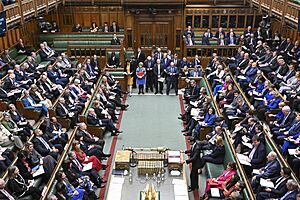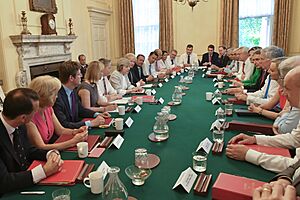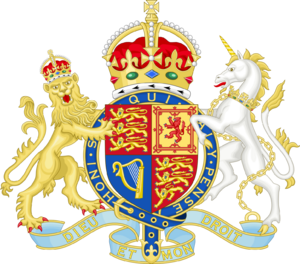Government of the United Kingdom facts for kids
Quick facts for kids His Majesty's Government |
|
|---|---|
| Welsh: Llywodraeth ei Fawrhydi Irish: Rialtas a Shoilse Scottish Gaelic: Riaghaltas a Mhòrachd |
|
|
Central government
|
|
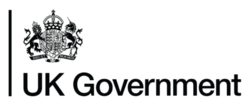 |
|
| Overview | |
| State | United Kingdom |
| Leader | Prime Minister (Keir Starmer) |
| Appointed by | Monarch (Charles III) on the advice of the prime minister |
| Main organ | Cabinet of the United Kingdom |
| Ministries |
|
| Responsible to | Parliament of the United Kingdom |
| Annual budget | GB£1.335 trillion (2025/26) |
| Headquarters | 10 Downing Street, London |
His Majesty's Government, often called HM Government or the UK Government, is the main group of people who run the United Kingdom of Great Britain and Northern Ireland. Think of it like the management team for the whole country! It makes important decisions and manages public services for everyone living in England, Scotland, Wales, and Northern Ireland.
The government is led by the Prime Minister, who is currently Keir Starmer. He became Prime Minister on 5 July 2024. The Prime Minister chooses other important people, called ministers, to help him. These ministers are in charge of different areas, like education, health, or defense. Together, the Prime Minister and his most senior ministers form a special group called the Cabinet, where big decisions are made.
The UK has a Labour government, which has been in power since the general election in 2024.
Ministers are responsible to the House they belong to. They make announcements and answer questions there. Most senior ministers are usually elected members of the House of Commons, not the House of Lords. The government needs Parliament's approval to make new laws. General elections happen at least every five years to choose new members for the House of Commons. After an election, the King chooses the leader of the party with the most support in the House of Commons to be Prime Minister.
Under the UK's constitution, the King holds the main authority. However, this power is always used based on the advice of the government. Most ministers directly lead different government departments.
The government is sometimes called "Westminster" or "Whitehall" because many of its offices are in those areas of London. These names help distinguish the UK Government from the Scottish Government, Welsh Government, and Northern Ireland Executive.
Contents
- A Brief History of the UK Government
- How the UK Government Uses its Powers
- Who Works in the Government?
- How the Government Works with Parliament
- Where is the UK Government Based?
- Rules and Limits for the Government
- What Does "Government" Really Mean?
- Symbols of the UK Government
- Governments Across the UK
- See also
A Brief History of the UK Government
The United Kingdom is a constitutional monarchy. This means it has a King or Queen as the head of state, but the monarch doesn't make political decisions. All the important choices are made by the government and Parliament. This system developed over many centuries.
A very important step was the Magna Carta in 1215. This document started to limit the power of the King, making sure he couldn't do whatever he wanted without rules. Over time, the power shifted more and more from the monarch to elected representatives in Parliament.
Since 1901, it has been a strong tradition that the Prime Minister must be an elected member of Parliament (an MP). This means they are directly answerable to the people through their representatives in the House of Commons. A similar tradition applies to the person in charge of the country's money, the Chancellor of the Exchequer.
How the UK Government Uses its Powers
The Monarch's Special Role
The British monarch (currently King Charles III) is the head of state. This is a very important role, but the King doesn't usually get involved in daily politics. Instead, the government uses powers that officially belong to the King. These special powers are known as the Royal Prerogative.
The King meets with the Prime Minister every week. What they talk about is private, but the King has the right to share his thoughts on government matters. However, the government ultimately makes the decisions.
What are Royal Prerogative Powers?
These powers allow the government to do many things without needing Parliament's direct approval for every single action. They include:
- Choosing and removing the Prime Minister. The King does this, but always picks the person who has the most support in the House of Commons.
- Appointing and removing other ministers (on the Prime Minister's advice).
- Approving new laws passed by Parliament. This is called royal assent. No monarch has refused to approve a law since 1708!
- Giving ranks to officers in the Armed Forces.
- Commanding the Armed Forces. This power is used by the Defence Council in the King's name.
- Appointing members to the Privy Council.
- Issuing and taking back British passports. This is handled by the Home Secretary.
- Granting pardons to people who have been convicted of crimes (the royal prerogative of mercy).
- Giving out honours (like knighthoods).
- Creating new organizations or giving cities special status by royal charter.

Dealing with Other Countries
The government also uses royal prerogative powers for international matters:
- Making and signing treaties with other countries.
- Deciding to declare war or make peace.
- Sending the Armed Forces to other countries.
- Recognizing other countries.
- Welcoming diplomats from around the world.
These powers come from old traditions, but the government published a list in 2003 to make things clearer.
Who Works in the Government?
There are around 120 government ministers. These ministers are supported by hundreds of thousands of civil servants and other staff. Civil servants are people who work for the government but are not politicians. They help ministers with their daily tasks and make sure government plans are carried out. They work in 24 main government departments and many other smaller departments.
Ministers usually need to be members of either the House of Commons or the House of Lords. This ensures they can be questioned and held accountable by Parliament. Sometimes, a Prime Minister might appoint someone who isn't in Parliament, but that person usually joins the House of Lords soon after.
How the Government Works with Parliament
The government needs the support of the House of Commons to do its job. This means Parliament must agree to the government's plans, especially when it comes to spending money (the budget) and making new laws. If the government loses the confidence of the House of Commons, it usually has to resign or call a new general election. The support of the House of Lords is helpful but not essential. The House of Commons is therefore the most important House for the government.
Asking Questions in Parliament
One important way Parliament checks on the government is through Prime Minister's Questions (PMQs). This happens every week, and MPs from all parties can ask the Prime Minister questions about anything. There are also special question times for different government departments, where ministers answer questions about their specific areas of work.
During debates about new laws proposed by the government, ministers explain the government's proposals and respond to comments from other MPs or members of the House of Lords. Committees in both Houses of Parliament also carefully examine the government's work and proposed laws. Ministers often appear before these committees to provide information and answer questions.
It's a rule that ministers should announce important new policies or national issues to Parliament first. This allows MPs and Lords to discuss and question the government's plans. If the government makes announcements outside Parliament first, it often receives criticism.
Where is the UK Government Based?
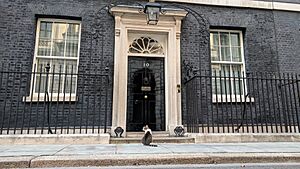
The Prime Minister's official home and office is at 10 Downing Street in Westminster, London. This is also where important Cabinet meetings take place. Many government departments have their main offices nearby in an area called Whitehall. Because of this, people sometimes refer to the UK government as "Westminster" or "Whitehall."
Rules and Limits for the Government
Even though the government has a lot of power, there are important rules and limits. Its powers come from old laws and new laws passed by Parliament. Courts can check if the government is following these rules through something called judicial review.
Local councils, which manage things like schools and rubbish collection in your area, also have their own powers. They are mostly independent but work closely with the central government, especially for funding. The government can step in if a local council isn't doing its job properly.
The King or Queen cannot be charged with crimes and can only be sued with their permission. This is called sovereign immunity. While the monarch is not legally required to pay income tax, Queen Elizabeth II chose to pay it voluntarily from 1993 until her passing in 2022.
What Does "Government" Really Mean?
When we talk about "the government," we usually mean the group of ministers currently in charge. But sometimes, the word "government" can also include all the people and organizations that work for these ministers. This includes the civil service, who are experts that advise ministers and help carry out their decisions. Some individuals who work for ministers even have "Government" in their job titles, like the Government Actuary. Even some companies owned by the government, like UK Government Investments, are sometimes seen as part of the wider government.
Symbols of the UK Government
The UK Government uses a simplified version of the Royal Arms as its official logo. This symbol, which has been used since 2024, appears on all new laws passed by Parliament, on the logos of government departments, and on the cover of all UK passports. It's a way to show that these documents and departments represent the authority of the King.
The use of the Royal Arms by government departments is managed by the Cabinet Office. It also appears on the diplomatic flags of British Ambassadors and in The London Gazette.
Some government departments, like the Scotland Office, Home Office, and Ministry of Defence, use slightly different symbols for historical reasons.
Governments Across the UK
- Further information: Scottish Government, Northern Ireland Executive, and Welsh Government
Since 1999, some powers of the central government have been given to separate governments in Scotland, Wales, and Northern Ireland. These are called "devolved governments." They make decisions for their own regions on matters like education and health. They are not part of His Majesty's Government in London, but they work alongside it. England does not have its own devolved government, but the Greater London Authority and other local groups have some special powers.
Local Councils
All parts of the United Kingdom also have local councils. These are elected groups that manage local services in your town or county, like parks, libraries, and local planning. They have some power to raise local taxes to help fund their work. Many other local authorities and agencies also have powers, usually supervised by the central government.
See also
 In Spanish: Gobierno del Reino Unido para niños
In Spanish: Gobierno del Reino Unido para niños
- Constitutional reform in the United Kingdom
- Departments of the United Kingdom Government
- Supreme Court of the United Kingdom
- Gov.uk
- Government spending in the United Kingdom
- British Government Frontbench
- His Majesty's Most Loyal Opposition
- List of British governments
- Northern Ireland Executive
- Scottish Government
- Welsh Government
- Whole of Government Accounts
- Office for Veterans' Affairs
 | Sharif Bey |
 | Hale Woodruff |
 | Richmond Barthé |
 | Purvis Young |


